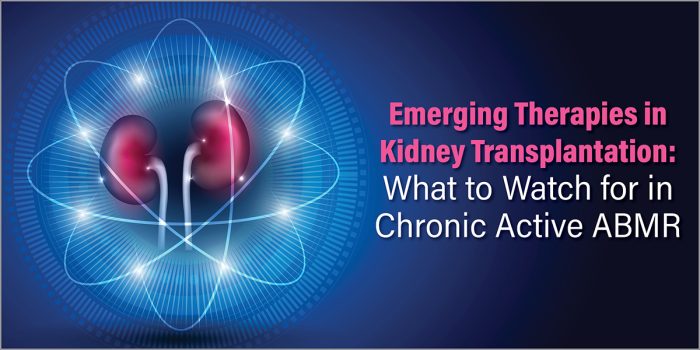
Renal transplantation is a potentially life-saving treatment for those with renal failure; however, graft rejection remains a real problem and long-term outcomes remain poor. Although many renal transplants are performed worldwide each year, only a fraction are living with functioning renal grafts, with approximately 40% of renal transplants failing within 10 years.
Chronic, or late renal graft rejection is a leading cause of renal graft failure. Though both T cell-mediated and antibody-mediated processes contribute to these late rejections, recent advances indicate that chronic antibody-mediated rejection (ABMR) is responsible for most cases of chronic graft rejection. Distinctions are made between chronic active and active ABMR based on the presence or absence of chronic graft remodeling; however, these subtypes likely reflect different points along a continuum of graft pathology.
Management of chronic active ABMR is a major challenge. There are currently no therapies indicated for the treatment of ABMR, and therapies used in the acute rejection setting do not have strong evidence supporting their efficacy in the chronic active ABMR setting. The emergence of several therapies currently under study in the setting of chronic active ABMR aim to bridge this gap. Here are 2 medications to watch in development.
Imlifidase is a recombinant IgG degrading enzyme derived from Streptococcus pyogenes that targets pathogenic IgG molecules and works to cleave all 4 IgG subclasses. Studies have shown that imlifidase can reduce or eliminate pathogenic IgG molecules within hours of administration, preventing antibody-dependent cellular cytotoxicity and complement-mediated cytotoxicity, allowing for HLA-incompatible transplantation.[1] Imlifidase is currently approved in Europe for kidney transplantation in highly sensitized patients. It is currently in Phase 3 clinical trials in the United States. Click here to learn more about imlifidase.
IL-6 is a pleiotropic cytokine that impacts immune cells, lungs, liver, heart, kidney, and bone function. IL-6 is responsible for the stimulation of B-cell differentiation to antibody-producing plasma cells. It also increases Th17 and Tfh cells and decreases Tregs and serves as a plasma cell and myeloma cell growth factor. In the kidney, IL-6 contributes to chronic antibody mediated rejection of kidney allografts.
Clazakizumab is an IL-6 targeting monoclonal antibody. Clinical trials in chronic active antibody-mediated rejection have shown that treatment with clazakizumab decreases donor specific antibodies and Banff Pathology Scores, improves graft function and survival, and stabilizes glomerular filtration rate (GFR),[2] with additional promising results in a small cohort of 10 patients with treatment-resistant chronic active ABMR.[3] It has also shown promise as a desensitization agent in patients awaiting kidney transplantation, demonstrating reductions in HLA alloantibodies and high rates of transplantation.[4] Clazakizumab is currently in Phase 3 clinical trials and is currently recruiting for the IMAGINE trial for treatment-resistant cABMR (NCT03744910). Click here to learn more about clazakizumab.
Additional strategies are being explored for the treatment of chronic active ABMR, including FcRn receptor blockers[5] and anti-CD38 antibodies,[6] among others.
Click here learn more about chronic active ABMR, including its pathophysiology, diagnoses, and emerging therapies. View now and earn CME credit!
[1] Jordan SC, et al. N Engl J Med. 2017;377(5):442-453.
[2] Doberer K, et al. J Am Soc Nephrol. 2021;32(3):708-722.
[3] Jordan SC, et al. Kidney Int Rep. 2022;7(4):720-731.
[4] Vo AA, et al. Am J Transplant. 2022;22(4):1133-1144.
[5] Jordan CS, et al. Transplantation. 2020;104(1):17-23.
[6] Doberer K, at al. Transplantation. 2021;105(2):451-457.
Share on Social Media
Earn CE Credit(s) with RMEI Medical Education